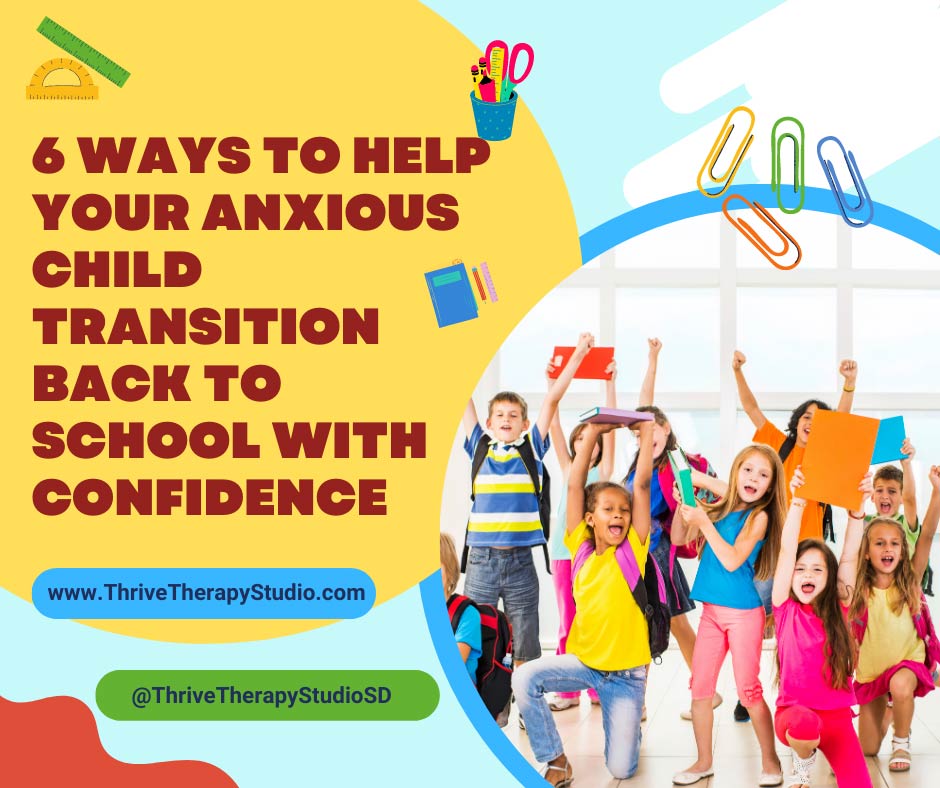6 Ways to Help Your Anxious Child Transition Back to School with Confidence

As much as summer has certainly gone by too quickly for most of us, school is coming up on us fast, and we definitely need to be ready for this transition! Especially for children who are prone to anxiety or separation issues. For them, the return to school can be particularly daunting, especially due to so many unknowns at the beginning of a school year.
Will I have friends in my class(es)?
Will I make new friends?
Will I like my teacher(s)?
As parents, we can support our children and their likely overwhelming emotions in this transition. Hopefully, we can even help them gain confidence in their ability to overcome challenges (aka build resilience and grit)! In this blog, I want to share some practical tips to empower your child and promote a positive back-to-school experience.
1. Start with Open Communication
I am always a big fan of communicating and approaching challenges with curiosity in families. The return to school is no different. We need to encourage our children to share their thoughts, feelings, and potential fears about the return to school and listen without any judgment or suggestions. You can reassure them that nervousness and anxiety are common with this time period, that you believe in their ability to handle this challenge, and that you will support them as much as possible.
2. Re-establish Routines Gradually
As I mentioned in my general back-to-school blog last week, it is important to begin preparing for the return to school in advance. For a more anxious child, I would recommend beginning this process about two weeks prior to the school year. This will help minimize the shock of the adjustment back to school.
3. Focus on the Positive Aspects
While we don’t ever want to ignore or breeze by our child’s concerns, we do want to present them with a balanced perspective of the upcoming school year. Make sure to share your own ideas about what might be enjoyable or even share your observation of the past years when your child has been able to overcome their fears to have a good time. If you can, elicit your child to share their own ideas about positive things that they hope for in the upcoming school year.
4. Teach Coping Strategies
We want to equip our children with as many tools as we can to help them through tough situations. Teaching them deep breathing, visualization strategies, and affirmations or mantras can help them cope with stressful situations. Make sure to practice these ahead of time so that they are well known to your child and they feel able to use them in a difficult moment. Keep in mind that coping strategies can be very helpful, but are not going to totally solve any problem that we have.
5. Set Clear Expectations
With more anxious children, it can be tempting to let things be more unclear. Such as, of course I can pick you up early, but only if you are having a hard time. Or, I am just a phone call away, but please don’t call. You get the idea, I’m sure. What we want to do for our more anxious children is let them know that we believe they are capable of staying the whole day at school and that at the end of the first week, we will celebrate them in some way. Then, make sure not to give in too easily if they begin asking to come home early. When we do that quickly, we do not give them the chance to persevere through a hard moment to realize they can do hard things. So, set clear expectations for your child ahead of time of what to expect and try not to accommodate their fears and anxiety by changing your behavior.
6. Set them up for Success
This might look different for different children. For some, you might set up a lot of play dates with friends and classmates ahead of time. For others, you might need to communicate with the school and their teacher ahead of time to let them know that your child might need more support in the transition. Many more anxious children will need both of these strategies, so make sure to put them in place for them to feel supported. Plus, make sure to let them know that they can always talk to you about their feelings and the challenges they face at school. Again, listen with curiosity and avoid judgment or jumping in to rescue them, as that just gives the message that they truly can’t handle it.
Back to school can be a tough transition for all children but particularly for more anxious children. With these tips and strategies, you will be able to support your child effectively and hopefully smooth the transition. If you or your child needs more support, please don’t hesitate to reach out to our team at Thrive!
Reach out to start
your healing journey

